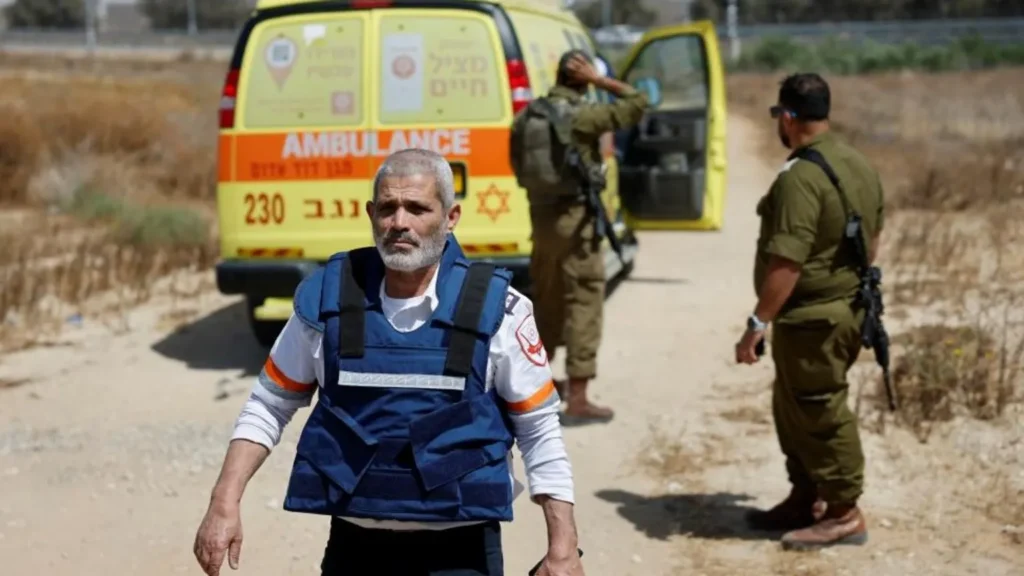Israel has closed the Kerem Shalom crossing into Gaza after Hamas fired rockets from within the strip.
Israel said the attack killed three of its soldiers, injuring several others.
The crossing is one of the few routes to get humanitarian aid, including food and medical supplies, into Gaza.
Mediators in the Egypt have held two days of talks aimed at securing a deal for a ceasefire in Gaza and the release of hostages held by Hamas.
In a statement, Hamas said the latest round had ended on Sunday and that its delegation would now travel from Cairo to Qatar to consult with the group’s leadership.
The CIA chief William Burns, who has also been involved in mediation efforts, has also left the Egyptian capital for talks in Doha, according to reports.
The truce proposal is believed to involve a 40-day pause in fighting while hostages are released, and the release of a number of Palestinian prisoners being held in Israeli jails.
Hamas said it viewed the current proposal in a “positive light”, but the main sticking point appears to be whether the ceasefire deal would be permanent or temporary.
The group is insisting any deal makes a specific commitment towards an end to the war, but Israel’s Prime Minister Benjamin Netanyahu rejected that on Sunday.
“The state of Israel cannot accept this [Hamas’s demands], we are not prepared to accept a situation in which the Hamas brigades come out of their bunkers, take control of Gaza again, rebuild their military infrastructure, and return to threatening the citizens of Israel in the settlements surrounding the southern mountains, in all parts of the country.
“This will be a terrible defeat for the state of Israel,” he added.
The war began after waves of Hamas gunmen stormed across Gaza’s border into Israel on 7 October, killing about 1,200 people and taking more than 250 hostages. The group is proscribed as a terrorist organisation by many Western countries.
During the subsequent Israeli military campaign in Gaza, more than 34,600 Palestinians have been killed and over 77,900 wounded, according to figures from the territory’s Hamas-run health ministry.
Mr Netanyahu has faced pressure from within his far-right coalition to press ahead with the long-promised offensive in Gaza’s southern-most city, Rafah, where an estimated 1.4 million people have taken shelter after fleeing fighting in northern and central parts of the strip.
The US is reluctant to back a military operation that could cause significant civilian casualties, and has insisted on seeing a plan to protect displaced Palestinians first.
The Israeli government also faces mounting pressure at home.
Of the 252 hostages who were kidnapped by Hamas on 7 October, 128 are still unaccounted for – and among them, at least 34 are presumed dead.
Al-Qassam Brigades, Hamas’s armed wing, says it carried out the attack on the Kerem Shalom crossing, saying it had targeted troops with short-range rockets.
The Israeli Defense Forces (IDF) said 10 projectiles had been fired from an area near the Rafah crossing in southern Gaza, about 3.6km (2.2 miles) from Kerem Shalom.
The IDF said they were fired from a site some 350m from a civilian shelter, before it destroyed the launcher and a nearby military site.
It called the launches “another clear example of the terrorist organisation’s systematic exploitation of humanitarian facilities and spaces, and their continued use of the Gazan civilian population as human shields”.
Ceasefire talks have gone on for months without a breakthrough, and there has not been a pause in fighting or a release of hostages since the end of November.
There have been moments at which a new agreement has seemed imminent – only to fall through before being signed.
Source: BBC
